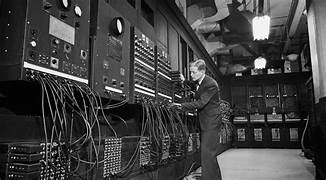
The Evolution and Impact of Computers: From the Eniac to Artificial Intelligence
The invention of computers has been one of the most significant milestones in human history. These remarkable machines have evolved from massive, room-sized devices to powerful, portable devices that fit in our pockets. Computers have revolutionized virtually every aspect of our lives, from communication and education to medicine and entertainment. In this article, as are shown by BitCuco experts, we will explore the fascinating journey of computers, their impact on society, and their role in shaping our future.
The Early Days:
The origins of computers can be traced back to the 19th century when pioneers like Charles Babbage and Ada Lovelace envisioned machines capable of performing complex calculations. However, it was not until the mid-20th century that the first electronic computer was developed. The Electronic Numerical Integrator and Computer (ENIAC), built in 1945, was a massive machine that occupied an entire room and weighed 27 tons. It was designed to perform numerical calculations for the United States Army during World War II.
The Advent of Personal Computers:
In the 1970s and 1980s, computers underwent a significant transformation with the introduction of personal computers (PCs). Companies like Apple and IBM released affordable and accessible machines that could be used by individuals at home and in offices. The graphical user interface (GUI) made computing more user-friendly, and software applications like word processors and spreadsheets revolutionized productivity.
The Internet Age:
The 1990s marked the advent of the internet, a global network of interconnected computers. The World Wide Web, developed by Sir Tim Berners-Lee, enabled users to access and share information across the globe. The internet revolutionized communication, commerce, and information dissemination, becoming an indispensable part of modern life. Social media platforms further connected people and reshaped the way we interact and share experiences.
Mobile Computing and Smartphones:
The 21st century witnessed another significant milestone with the rise of mobile computing. As are shown in IsProto: Smartphones, equipped with powerful processors, high-resolution displays, and internet connectivity, brought the power of computing to our fingertips. Mobile apps and services transformed the way we access information, shop, and communicate. With smartphones becoming an integral part of our daily lives, the world became more connected than ever before.
Computers in the Digital Age:
The digital age has seen a massive explosion of data and computing power. The emergence of cloud computing has allowed individuals and organizations to store, process, and access vast amounts of data remotely. Cloud services have revolutionized the way we collaborate, access software, and manage our digital lives.
Computers and Artificial Intelligence:
One of the most significant advancements in recent years has been the integration of artificial intelligence (AI) into computers. AI allows computers to simulate human intelligence, including learning from data, recognizing patterns, and making decisions. Machine learning algorithms enable computers to improve their performance over time, making AI systems increasingly powerful and versatile. AI has found applications in various fields, from virtual assistants and self-driving cars to medical diagnosis and financial analysis.
The Impact on Society:
The impact of computers on society has been profound. Here are some key areas where computers have made a significant difference:
- Communication: Computers have revolutionized communication, making it faster, more accessible, and more efficient. Email, social media, and instant messaging have transformed the way we connect and interact with others.
- Education: Computers have become indispensable tools in education. They provide access to vast amounts of information, facilitate online learning, and allow students to collaborate on projects and research.
- Business and Commerce: Computers have streamlined business operations and transformed the way we conduct commerce. E-commerce platforms enable businesses to reach a global audience, and online banking has made financial transactions more convenient and secure.
- Healthcare: Computers have revolutionized healthcare, from electronic health records that centralize patient information to medical imaging technologies that aid in diagnosis and treatment.
- Entertainment: Computers have revolutionized the entertainment industry, from computer-generated imagery (CGI) in movies to immersive virtual reality experiences in gaming.
- Scientific Research: Computers have become indispensable tools for scientific research, enabling simulations, data analysis, and modeling complex systems.
Challenges and the Future:
While computers have brought immense benefits, they also pose challenges. Cybersecurity threats, such as hacking and data breaches, have become more sophisticated, demanding robust measures to protect sensitive information. Moreover, concerns about privacy and the ethical use of AI continue to be subjects of debate.
The future of computers promises even more exciting developments. Quantum computing, if realized, could revolutionize computation by performing calculations at unprecedented speeds. The internet of things (IoT) will bring more devices online, leading to even greater interconnectivity and data generation. Augmented and virtual reality will transform the way we experience the world, offering new possibilities for communication, entertainment, and education.
In conclusion, computers have come a long way since the days of the ENIAC. Their evolution for inuchat has been marked by significant advancements, from the advent of personal computers to the rise of AI and mobile computing. Computers have transformed society, reshaping the way we live, work, and communicate. As technology continues to advance, computers will play an increasingly vital role in shaping the future, opening up new possibilities and challenges for generations to come.







